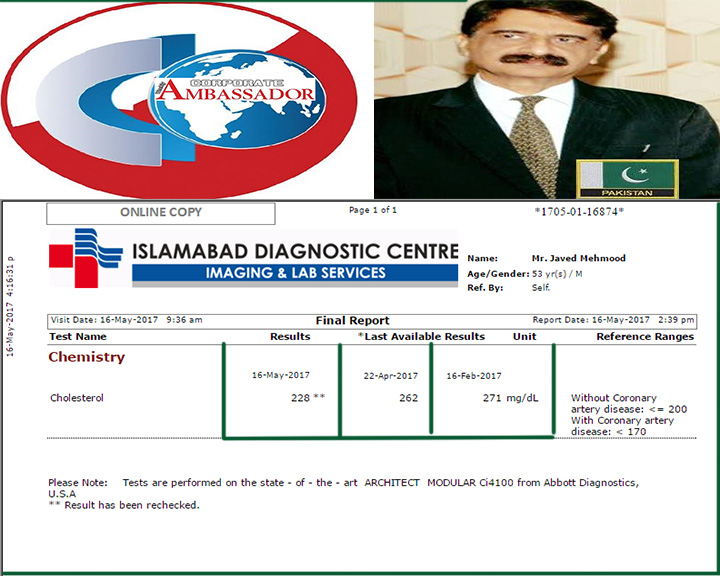
By J. Choudhry/ISLAMABAD
(it is my personal experience _ there is no side-affect of pumpkin, taste is also good)
I am a patient of high cholesterol. A few years ago, I started feeling stress on my heart. My physician advised me to have ECG test immediately.
However, my ECG test was okay, but the symptom of stress on my heart continued persistently that worried my and my physician. Then on the advice of my doctor, I got my cholesterol tested at Aga Khan Laboratory in Karachi. I gave my blood sample at Aga Khan Lab’s collection center in Delton Market of DHA Phase-5 in Karachi. At that time, I was working with daily The Nation, Karachi, as Resident Editor.
The cholesterol test for me was very stunning as my bad cholesterol was in the range of 290 against the maximum limit of 200 without coronary (heart disease) and 170 with this disease. In other words we can say that red-line starts with 200 and if your LDL (bad cholesterol) is beyond this level, it poses a risk of heart attack or brain hemorrhage.
After getting report of Aga Khan Laboratory, I gave my blood sample at Dr Essa Lab & Diagnostic Center in Zamzama branch, Karachi and the result was the same. The only difference was that Dr Essa Lab & Diagnostic Center charged half of the fee that I paid at Aga Khan Lab.
After getting high cholesterol report, I immediately rushed to my doctor, who prescribed tablet Rosulin (10/mg) daily at night before going to bed. For three consecutive months, I used this medicine and reduced the bad cholesterol close to 220 points _ then I almost forgot the cholesterol problem and gave no attention to it and ate everything ignoring advice of the doctor.
In Feb-2017, I again gave my blood sample for cholesterol test just to find out the latest status of my bad cholesterol. I was stunned to see 271-LDL (bad cholesterol) against maximum permissible limit of 200 points. I started searching on the Google ways and techniques to reduce cholesterol.
Finally, I saw an article in which the website managers and readers suggested the use of ripe-pumpkin to kill the bad cholesterol. I visited vegetable shops and Sunday Bazar in Islamabad in Feb/March-2017, but could not find pumpkin. A shopkeeper said the pumpkin arrives in market in April.
From mid-April to mid-May (one month), I used the prescription/recipe of pumpkin and the result was very favourable as the cholesterol fell to 228 points, from 262 in April and 271 in Feb-2017. Readers can find the results of my three reports, included in the latest report of May 16, 2017 by the Islamabad Diagnostic Center (IDC).
From Feb 16, 2017 to April 22, 2017, I used Rosulin tablet (30 tablets only during this period), but I could not reduce cholesterol to the desired level.
However, from mid-April to mid-May this year, I applied the pumpkin formula that reduced my bad cholesterol to 228 points even though during this period I kept on eating ‘Paratha’ and omelet in the breakfast.
What is the Pumpkin formula?
You just need 100-grams ripe pumpkin. Get a slice of fresh pumpkin, peel the skin and just keep the ripe portion of the vegetable, weigh it on digital scale so that it could not exceed 100-grams. Ripe Pumpkin is available in two colours _ Pakistani pumpkin is in yellow colour and Chinese pumpkin is in orange colour. Pakistani pumpkin is original and it is more effective in killing the bad cholesterol. It costs about Rs 30 to 40/kg. Always use fresh pumpkin and avoid frozen to get better result.
Cut the 100-grams pumpkin (without skin) into small slices and shake it in grinder it with water to make just one glass of pumpkin-juice _ add nothing to it except water and take its small sips, an hour before breakfast _ once a week, if the bad cholesterol is little over 200 points. But if the LDL is far above 200 points, then you can use this juice twice a week and also take one-tablet of Rosulin or any other similar tablet for 20-days and you will see a stunningly good result.
If you just use pumpkin juice, you can kill your unwanted cholesterol with just 100 rupees in a month and if you use anti-cholesterol tablet of 10-mg alongwith pumpkin, you will spend 20 rupees per tablet daily. So choose the way that suits you.
I am sharing this with you because my personal experience of lowering the bad cholesterol is very good with pumpkin juice, once a week (for one month and 10-tablets of Rosulin 10-mg each tablet).
Now I will continue to apply the pumpkin and Rosulin formula on myself for another 10-days (before the start of holy month of fasting) and then I will have fresh test of my cholesterol that I will share with you. By that time, I am sure my bad cholesterol will be below 200 points.
What is LDL or bad cholesterol?
This disease is known as a silent killer. Bad cholesterol narrows the blood-veins and blocks the smooth supply of blood to heart and other organs that, at some stage, either leads to heart attack or brain hemorrhage. Thousands of people are dying every year because of heart failure and brain hemorrhage and bad cholesterol is one of the main cause of heart failures.
Here is a new American research on bad cholesterol
A new American study points out that many adults under 40 may not need to have routine cholesterol screenings. To come to this conclusion, the researchers looked at the real world implications of two conflicting sets of guidelines on cholesterol testing.
One, from the American College of Cardiology/American Heart Association (ACC/AHA), says that all adults older than 20 should have a cholesterol screening. They also suggest a repeat test every four to six years.
The other guidelines come from the U.S. Preventive Services Task Force, a government-funded, independent panel of medical experts. They say many adults can go longer before their first cholesterol test — until age 35 for men, and age 45 for women.
The exception would be people with a major risk factor for heart problems — such as high blood pressure, smoking or a family history of early heart disease. Those patients can start cholesterol testing at age 20, the task force adds.
The new findings support the “more targeted” approach the task force uses, according to lead researcher Dr. Krishna Patel, of Saint Luke’s Health System in Kansas City, Mo.
Why? The study, Patel explained, tried to estimate the impact of the two different guidelines in the “real world.”
To do that, the researchers used data on 9,600 U.S. adults aged 30 to 49 who were part of a government health study. The study team found that among nonsmokers with normal blood pressure, very few were at heightened risk of suffering a heart attack in the next 10 years. That means very few would be considered candidates for a cholesterol-lowering statin — even with elevated LDL (so-called “bad” cholesterol) levels.
“So, screening cholesterol early doesn’t bring much actionable information,” Patel said. “If we’re not going to treat, there’s no point in doing it.”
The study was published May 15 in the Annals of Internal Medicine.
Others disagreed with Patel’s point. The point of screening younger adults is not so doctors can put them all on statins, said Dr. Neil Stone, one of the authors of the ACC/AHA guidelines.
Instead, there are two central reasons, Stone explained. One is to spot younger adults who may be heading down a path toward heart disease later in life.
Once they know their LDL is high, they and their doctors can have an “all-important discussion” about diet and lifestyle changes, said Stone, who is also professor of medicine at Northwestern University’s Feinberg School of Medicine in Chicago.
The other reason is to catch cases of familial hypercholesterolemia, a genetic condition that causes very high LDL levels (above 190 mg/dL), he said.
People with the condition have a much higher-than-average risk of heart disease, and often develop it at a young age.
Because of that, the condition should be treated with statins, according to the ACC/AHA.
There is “strong and compelling evidence,” Stone said, that catching the condition in younger adults makes a difference.
Dr. Paul Ridker, who wrote an editorial accompanying the study, had a similar view.
“Familial hypercholesterolemia is a common disorder, and it’s easy to detect,” said Ridker, of Brigham and Women’s Hospital in Boston. “Why delay something as simple and inexpensive as a cholesterol test?”
Plus, he said, catching even “run-of-the-mill” high LDL is important.
“Knowing about it early in life can be a good motivator to make lifestyle changes,” Ridker said.
What if a young adult has healthy LDL levels? Ridker said he’d be “fine” with that patient forgoing further tests until later in life.
For her part, Patel agreed that a one-time check, to catch familial hypercholesterolemia, is a wise move for young adults. But she questioned the value of repeat testing.
According to Stone, the ACC/AHA guidelines say it’s “reasonable” to repeat cholesterol testing every four to six years. “It’s not mandatory,” he noted.
But people’s lives, and heart disease risk factors, change as they move through adulthood, Stone said. So, a periodic cholesterol check can be useful when it’s done as part of a “global risk assessment” where doctors look at blood pressure, smoking habits and other major risk factors for heart disease.
Motivating younger adults to get those risk factors under control is critical, according to Stone. “We know it’s a big deal if you can have optimal risk factor [control] by age 45 or 50,” he said.
In the study, very few people were at elevated risk of heart attack — as long as they didn’t smoke or have high blood pressure. (“Elevated” meant a greater than 5 percent chance of having a heart attack in the next 10 years.)
In the absence of those two risk factors, only 0.09 percent of men younger than 40 were at elevated risk of heart attack. And only 0.04 percent of women younger than 50 were.
But smoking, in particular, changed everything: Among male smokers in their 40s, one-half to three-quarters were at elevated risk of a heart attack.
“Smoking had a huge effect,” Patel said. Smokers, she stressed, should “definitely” have their cholesterol tested — and, more importantly, quit the habit.
End





